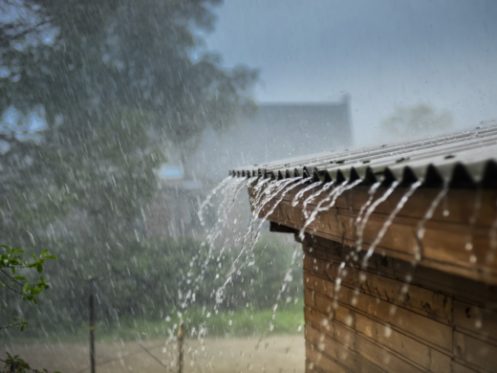If you’re like most Texas homeowners, you rely on your home’s HVAC system to stay cool in the summer and warm in the winter. While scheduling regular maintenance and properly changing out air filters are necessary parts of a great-running HVAC system, they’re not the only factors that can affect its performance. Did you know that the weather outside can alter how well your HVAC system operates?
Heat Waves
Most homeowners don’t give their air conditioning systems much thought until they stop working correctly. This is typical when there are unexpected heat waves that hit the Texas area. The reality is that most residential air conditioning systems are designed to alter the temperature between 15 and 25 degrees, depending on their individual capacity.
When heat waves strike with temperatures in the high 90s to low 100s, your air conditioning system is going to have trouble keeping up with your cooling needs. Let’s say the temperature outside is 100 degrees. You can expect your air conditioning system to cool your home to between 75 and 85 degrees.
Just because you’re used to your AC system cooling your home to the low 70s, that’s not always possible when the outdoor temperatures are under a heat wave. It’s best to practice some other tactics for making it feel cooler inside of your home. Some of these include turning your ceiling fans on, closing your blinds, using a clothesline, and cooking outside.
Strong Winds and Flooding
Texas has been known to experience some volatile thunderstorms and nasty flooding. As a homeowner, it’s important that you take the time to protect your HVAC components from damage due to these unusual conditions. One great rule of thumb is to always keep about three feet of open space around your outdoor condenser unit. This means trimming back shrubs and tree limbs.
Don’t store anything heavy near your unit that could come crashing down onto it. Consider investing in hail guards for your condenser unit to keep out flying debris. This heavy mesh guard can stay on throughout the entire year, regardless of whether it’s gusting strong winds or a scorching hot and sunny day.
When it comes to flooding, preparation is in the design of your system. Having your outdoor condenser unit placed on tall blocks is a great way to help ensure that flood water doesn’t penetrate the unit. Additionally, installing water diversion systems, like a french drain, can help to divert water away from your condenser unit. If your condenser unit undergoes more than 15 inches of flooding, it’s best to call an HVAC professional to get your system assessed for damage before running it.
Power Outages
When nasty storms blaze through Texas, it can result in annoying power outages that can last for days. Instead of being at the mercy of this crazy weather, do your family a favor and invest in a generator. Whole-home generators are a great way to help provide energy for the various systems throughout your home, such as your air conditioning system.
They can allow you to enjoy a nice and cool home even when your power is out. It’s crucial to realize that there are many different sizes of backup generators. It’s best to consult an HVAC professional about which generator is ideal for running the systems currently in your Texas home.
Excessive Dust and Debris
With the constant change in weather patterns during the colder seasons, the amount of dust and debris in your home tends to increase. Unfortunately, most homeowners only think that they need to change their air filters every three months. That’s not always the case.
During times of excess wintertime dust, you should be checking your air filter every couple of weeks. You’ll likely be surprised at how quickly your filter gets dirty and needs to be replaced. Replacing a clogged air filter is an absolute necessity to ensure that your heating system is working as efficiently as possible.
Deep Freezes
Most Texans love the fact that wintertime temperatures usually don’t get below freezing. However, some crazy Texas weather can strike from time to time. When temperatures drop below freezing for an extended period of time, it’s referred to by weather experts as a deep freeze for the area.
With most Texas homeowners relying on a heat pump to provide heat for the winter season, deep freezes can spell disaster. Heat pumps are designed to work in mild climates where temperatures rarely dip below freezing. When temperatures remain below freezing for days, this can lead to massive problems.
Heat pumps are simply not designed to adequately keep up with home heating demands in these conditions. Unfortunately, many homeowners simply let their heat pumps run ragged and end up prematurely wearing out their components. Instead, you should plan for supplemental forms of heat whenever deep freezes strike to keep your heat pump from overworking. Some great ideas include burning wood in a fireplace and running space heaters.
Tips for Preventing Your HVAC From Overworking
As a smart homeowner, there are a few practices that you can partake in to help prevent your HVAC from overworking during the winter and summer months. The first thing that you can do is invest in insulation for your home. Insulation in walls and in your attic can help to keep cooled air inside during the summer and warm air inside during the winter. Think of insulation as a barrier between the inside of your home and the outdoors. The thicker the barrier, the less likely it’s going to affect the other.
Another great practice is to invest in ceiling fans. These fans can be used year-round to help keep your family feeling comfortable in your home while running your HVAC system less. In the summertime, you want your blades to spin counterclockwise so that air is forced down onto you. This simple breeze can chill your body up to 10 degrees. In the wintertime, you want the fans to be spinning in a clockwise direction to recirculate the hot air from the ceiling, outward, and back down to the floor.
Direct sunlight can play a major role in determining the temperature inside your home. If you have windows that are letting direct sunlight seep in, it can heat up the interior of your home up to 15 degrees. This can be a great source of free heat during the colder winter months. However, during the summer, you’ll want to block out this direct sunlight with curtains or blinds during the daylight hours.
Lastly, you should make use of a smart thermostat to help control your home’s temperature when you’re not at home. Don’t fall victim to turning your HVAC system off when you’re not at home. This just causes your system to overwork when you get back home and turn it on. Rather, adjust the temperature 10 degrees up or down depending on the season.
In the winter, setting your thermostat 10 degrees colder when you’re not at home allows your heating system to run less during this time. When you head back home, you can have your smart thermostat automatically increase the temperature 10 degrees, which is a manageable feat for your heating system to accomplish without overworking.
Helpful HVAC Services
On Time Experts provides helpful HVAC services for the entire Garland, TX area. We also offer top-quality plumbing, air quality, and duct cleaning services. Simply contact us today to get the professional assistance that you need with your home.

